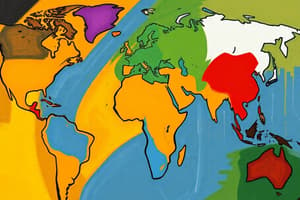Podcast
Questions and Answers
What is an 'ethnoscape' as defined by Arjun Appadurai?
What is an 'ethnoscape' as defined by Arjun Appadurai?
- The flow of cultural ideas
- The global movement of financial resources
- The global movement of people (correct)
- The circulation of mechanical goods
What are the five 'scapes' identified by Arjun Appadurai?
What are the five 'scapes' identified by Arjun Appadurai?
Ethnoscape, mediascape, technoscape, financescape, ideoscape
Appadurai argues that there is only one form of globalization.
Appadurai argues that there is only one form of globalization.
False (B)
What significant change occurred regarding trade between 1980 and 2007?
What significant change occurred regarding trade between 1980 and 2007?
What does the International Monetary Fund (IMF) regard as 'economic globalization'?
What does the International Monetary Fund (IMF) regard as 'economic globalization'?
Who does the World Bank lend money to?
Who does the World Bank lend money to?
The oldest known international trade route is the ______.
The oldest known international trade route is the ______.
High-frequency trading allows supercomputers to execute millions of trades within seconds.
High-frequency trading allows supercomputers to execute millions of trades within seconds.
Since its opening in 130 BCE, the Silk Road was regularly used until it was closed by the ______.
Since its opening in 130 BCE, the Silk Road was regularly used until it was closed by the ______.
Flashcards are hidden until you start studying
Study Notes
Globalization and Appadurai's Scapes
- Arjun Appadurai defines globalization through various dimensions called "scapes."
- Each "scape" represents a different aspect of globalization:
- Ethnoscape: Movement of people across borders.
- Mediascape: Flow of cultural elements globally.
- Technoscape: Circulation of technologies and mechanical goods.
- Financescape: Global movement of money and financial instruments.
- Ideoscape: Transmission of political ideas and values.
- These scapes intersect but possess distinct logics, providing diverse perspectives on globalization.
Concepts of Globalization
- Globalization is multi-faceted; different aspects can lead to various dynamics.
- Key questions include:
- What is globalization?
- What specific elements are being globalized?
- Understanding globalization requires recognizing its complexity and the networks involved.
Economic Globalization
- Defined by the IMF as a historical process driven by innovation and technology.
- Characterized by increased integration of global economies through the movement of goods, services, and capital.
- The World Bank, comprising 189 member countries, aims to reduce poverty by funding development projects, with over 12,000 projects funded since 1947.
Trade and Economic Growth
- Global trade as a percentage of world GDP rose from 42.1% in 1980 to 62.1% in 2007.
- Significant increase in foreign direct investments from US57billionin1982toUS 57 billion in 1982 to US57billionin1982toUS 1.76 trillion in 2015.
- The evolution of trading mechanisms, with high-frequency trading executed by supercomputers, exemplifying increased speed and volume of transactions.
Historical Context of Trade
- The Silk Road is the earliest known international trade route, connecting China, the Middle East, and Europe.
- Established during the Han dynasty around 130 BCE and utilized for centuries until the Ottoman Empire closed it in 1453 CE.
- Silk was a primary commodity traded, emphasizing the route’s historical economic significance.
Modern Implications of Globalization
- Contemporary globalization reflects major changes including the digitization of products (e.g., e-books, digital music).
- Examines beneficiaries of economic globalization and those marginalized by the changing landscape.
Studying That Suits You
Use AI to generate personalized quizzes and flashcards to suit your learning preferences.




